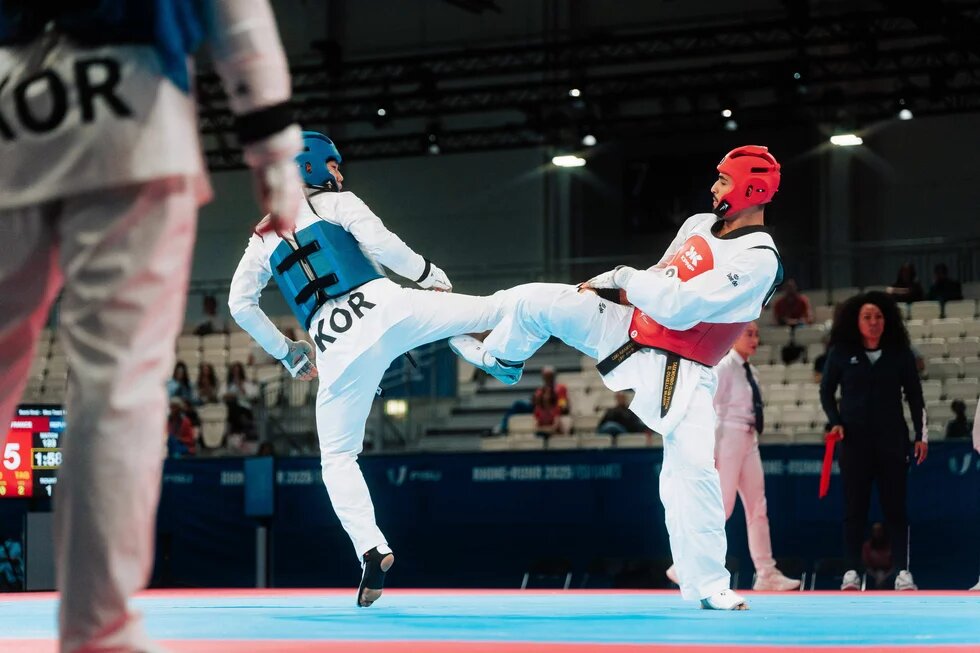South Korean men, trapped in the rigid ‘K-timeline’ from school to military to marriage, face endless pressure to prove their masculinity, fueling resentment toward women and radicalization. A transformation is needed, with care at its core.

A Dangerous Drift
In 2025, the Netflix series Adolescence drew international attention for its sharp depiction of an incel culture and online misogyny. The show sparked renewed discussion in South Korea, where political upheaval had already brought young men into the public spotlight. Social attention to Korean young men had begun as early as 2019. At the time, the current affairs magazine SisaIN conducted an in-depth survey of men in their twenties. The results showed that many perceived themselves as victims of reverse discrimination, and about one-quarter openly identified as anti-feminists. This survey soon came to be known as the phenomenon of the “idaenam” (a Korean abbreviation for “men in their twenties”), sparking wide public debate. The media covered the shocking results extensively, while right-wing politicians tapped into the resentment and anger of young men as a political resource. One such figure was former president Yoon Suk-yeol, who pledged during his campaign to abolish the Ministry of Gender Equality and Family. Yoon exploited young men’s anger at what they saw as female-centered policies that discriminated against them. From that point on, discussions around the anti-feminism and conservatization of young men continued to unfold in Korean society.
In December 2024, former President Yoon Suk-Yeol declared martial law. After intense public resistance, his impeachment took place in April 2025. The world looked on, impressed by how swiftly and effectively Korean democracy seemed to respond to the crisis. Yet behind the scenes of this political drama, another question emerged. As the national crisis stabilized, incidents like the violent riot at the Seoul Western District Court brought renewed attention to the radicalization of young men. Supporters protesting Yoon’s arrest stormed the courthouse, smashing doors and furniture. According to police reports most of the rioters were young men. It was the first violent event of its kind since peaceful protest had become the norm and the shock was profound.
Once again people began to ask: “What is happening to young Korean men?”
To answer this question, we must look beyond political ideologies or party dynamics. We need to examine the deeper cultural scripts that shape masculinity in South Korea. At the heart of this inquiry lies the so-called “K-Timeline” — a rigid life path that many Korean boys and men are expected to follow. The concept was introduced in anthropologist An Hee-je’s book Proofs and Excuses, which is based on interviews with his friend Woojin. In the course of these conversations, Woojin described his own life using the term “K-Timeline.” He spoke about his repeated efforts and failures to prove himself a “normal man.” And developed this into a broader framework to describe the life cycle that traps many young Korean men. In this cycle, they are caught in an endless loop of proof and excuse. From early education to college entrance exams, military service, dating, marriage, and parenting, each milestone must be achieved “on time” and in the correct order to be recognized as a “normal man”. Deviating from this timeline, leads people to label that person as a man of failure, which in turn, becomes a source of shame, frustration, and, in many cases, resentment toward women.
The K-Timeline: Life Stage Tasks and the Burden of Masculinity
Adolescence: Hierarchies and Hatred in the Classroom
In South Korea, people judge adolescents by a single metric: academic performance. A student’s worth is reduced to their grades and the name of the university they will attend. Classrooms have become battlegrounds of hierarchy. To survive, boys must excel academically, entertain their peers, or show physical dominance. Those who fall short are often left behind or bullied.
The language and culture of the classroom are steeped in misogyny and queerphobia. Phrases like “you act like a girl” serve to shame boys who deviate from expected masculine norms, while questions like “are you gay?” are used to humiliate those seen as insufficiently masculine. The classroom becomes the first arena where masculinity is constantly tested and misogyny operates as a measuring stick.
Military Service: Institutionalizing Misogyny
Every Korean man is legally required to complete mandatory military service. The majority of men consider this obligation to be deeply unfair and frequently redirect this sentiment toward women. Common phrases among young men include, “True equality means women should serve, too,” or “Women got ahead of us by using that time for self-improvement.” Some even continue to call for policies like the military bonus point system as a form of compensation for their “lost time.” The system, which applied to various public sector recruitment exams including civil service positions and granted male veterans additional points, was ruled unconstitutional in 1999 for discriminating against women and people with disabilities.
Military service is widely viewed as unfair and fuels resentment toward women.
However, it also institutionalizes toxic masculinity. To avoid being labeled "dead weight," soldiers must constantly prove their worth in a rigid hierarchy where sexist jokes and objectification toward women are normalized.
Entering the Job Market: Resentment and the Rhetoric of ‘Fairness’
As they prepare to enter the job market, many young men see this stage as the key test of their masculinity — proof that they can achieve financial independence and social recognition as “real men.” Yet they also express a strong sense of resentment, believing they have fallen behind women who did not serve in the military and had more time to study or build careers. This perception fuels opposition to gender quota policies. In online communities, men have continuously sharing similar sentiments 'If you want fairness, just hire based on scores. Why factor in the gender perspectives?'
The reality is more complex. While women may enter the workforce earlier, they face a far greater risk of career interruption due to marriage, childbirth, and caregiving responsibilities. Importantly, gender quotas do not exist to advantage women exclusively—they exist to prevent extreme gender imbalances. According to the Korean government’s 2020 annual report on gender equity in the public sector, while more women benefited from the quota system from 2003 to 2011, since 2012, more men have been admitted due to the same system. Nevertheless, male resentment often targets women rather than questioning broader gendered systems.
Marriage and Parenting: Breadwinner Pressures and the “Pongpong Nam” Scenario
Marriage and parenting represent yet another stage of masculine validation. Although dual-income households have become the norm, an implicit expectation persists: men should earn slightly more than their wives. This often leads men to take control in key decisions like purchasing a home or relocating under the belief that “the one who earns more gets to decide.”
Even when domestic labor appears to be evenly divided, the data tells a different story. According to a 2023 national survey by the Ministry of Gender Equality and Family, 73.3% of households reported that wives do most of the housework. Men often perceive themselves as “helping,” while women continue to shoulder the double burden of employment and unpaid care. At the same time, parental leave remains rare: in 2023, only 7.4% of eligible fathers used it, according to Statistics Korea, compared to 73.2% of mothers.
At one point, Korean online communities popularized the term “Pongpong Nam” (named after a well-known dish soap). The term mocks naive men who hand over financial control to their savvy wives and end up doing all of household chores themselves. When gender roles are reversed, men who take on domestic roles are seen as weak, revealing how hegemonic masculinity penalizes men for failing to lead and earn.
The K-Timeline is not merely a social pattern; it is a blueprint for hegemonic masculinity embedded within Korean society.
We must analyze how this timeline constructs male subjectivity, produces gendered anxieties and hatred and influences both personal lives and public behavior. At the same time, we must begin imagining what alternative masculinities might look like outside of this rigid script.
Beyond a Life of Proof: Solidarity, Care, and Everyday Democracy
In South Korean society, men are expected to follow the so-called “K-Timeline”, constantly learning, competing, and striving to prove themselves. Yet, this pursuit is endless as the proving can never truly be complete. Masculinity is socially constructed and constantly evolving, making it impossible for anyone to fully live up to its standards. This endless game of validation inevitably leads to failure, resulting in self-blame and anger. That anger is often directed at those more vulnerable—women, LGBTQIA+ persons, immigrants, people with disabilities—through a process of projection. The sense of unfairness—“It’s not fair,” “Only women get the benefits”—often targets women as emotional scapegoats rather than addressing the structural unfairness itself.
Yet there is real potential to turn this into constructive criticism of structure. In South Korea, women have long understood and organized to fight against structural oppression. A representative example is the 2018 protests against illegal filming. Women shared their experiences online, gathered in mass protests in public squares, and drove changes in civil society. This movement marked the rise of a new wave in Korean feminism: digital feminism. Rather than internalizing their rage in isolation, women politicized the issues and mobilized around them.
Korean men, too, need to experience this politicization of emotion and the power of solidarity, and such change can begin in everyday life. At the core of this transformation is care. This shift is already emerging in small but significant ways. For example, Feminism with Him is a group formed to question toxic masculinity and experiment with alternative male cultures. Its members engage in education, test new forms of care practices, and create spaces of solidarity. These efforts are not perfect and offer no clear answers, but they represent an essential first step toward change.
Korean men must now move beyond a masculinity for which they constantly need to prove themselves. Being a “real man” is not about earning more money, having a strong physique, or being dominant. Men and women alike need to share emotions, practice care, and form their identity through solidarity.
When men can politicize their pain and take shared responsibility for the pain of others, they can defend their dignity without threatening that of others. This is the starting point for a masculinity that realizes democracy in everyday life.

